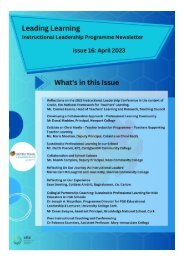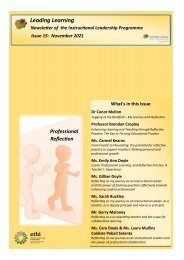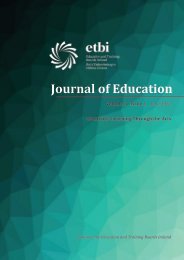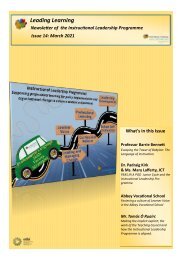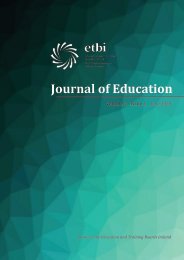ETBI Journal of Education - Vol 2:2 November 2020 (Irish-medium Education)
This bilingual edition of the Journal of Education celebrates Irish-medium Education
This bilingual edition of the Journal of Education celebrates Irish-medium Education
Create successful ePaper yourself
Turn your PDF publications into a flip-book with our unique Google optimized e-Paper software.
<strong>ETBI</strong> <strong>Journal</strong> <strong>of</strong> <strong>Education</strong> <strong>November</strong> <strong>2020</strong><br />
Leadership in Post-Primary Immersion<br />
<strong>Education</strong> in unprecedented times<br />
Dr T.J. Ó Ceallaigh - Mary Immaculate College, Limerick<br />
ABSTRACT<br />
School leadership practices have changed<br />
considerably and maybe, irreversibly because<br />
<strong>of</strong> COVID-19. As a result <strong>of</strong> the pandemic, school<br />
leadership has shifted on its axis and there seems<br />
to be little chance that things will go back to<br />
the way they used to be anytime soon, if ever.<br />
Research has explicitly shown that the principles<br />
<strong>of</strong> good leadership are a constant, i.e. having a<br />
clear vision, developing others, managing people,<br />
building capacity etc. (Leithwood et al., <strong>2020</strong>). The<br />
evidence also points towards the importance <strong>of</strong><br />
context responsive leadership implying a shift in<br />
school leadership practices because <strong>of</strong> COVID-19<br />
(Harris, <strong>2020</strong>). Now more than ever, there is a<br />
need for immersion-specific research-validated<br />
tools which support leaders in navigating the<br />
school self-evaluation process in their quest for<br />
educational excellence in immersion. This paper<br />
firstly discusses the importance <strong>of</strong> leadership in<br />
immersion education. It then provides an overview<br />
<strong>of</strong> an immersion-specific self-evaluation tool for<br />
school leaders as a means <strong>of</strong> enhancing school<br />
development through the extensive school selfevaluation<br />
process in <strong>Irish</strong>-<strong>medium</strong> and Gaeltacht<br />
immersion education.<br />
INTRODUCTION<br />
Research that points to the benefits <strong>of</strong> immersion<br />
education is typically based on outcomes<br />
STUDIES OF EFFECTIVE<br />
IMMERSION EDUCATION SCHOOLS<br />
CONSISTENTLY SHOW THAT HIGH<br />
LEVEL PROGRAMMES HAVE A<br />
SHARED, COHESIVE VISION, GUIDED<br />
BY VISIONARY LEADERSHIP<br />
associated with effective leadership and<br />
management processes (Genesee et al., 2006;<br />
Hunt, 2011; Thomas & Collier, 2017). Effective<br />
leadership in immersion plays a core role in<br />
school development by vigorously engaging in the<br />
school self-evaluation process, raising standards,<br />
identifying areas for continuous improvement,<br />
sharing knowledge and advocating continuous<br />
pr<strong>of</strong>essional development (Rocque et al.,<br />
2016). However, sustained improvement in the<br />
educational outcomes for language immersion<br />
students depends on the quality <strong>of</strong> leadership<br />
at a number <strong>of</strong> levels in the immersion context.<br />
Although there is much literature on educational<br />
leadership in general that identifies characteristics<br />
<strong>of</strong> a ‘successful’ school leader (Leithwood &<br />
Day 2007; Waldron et al., 2011), meeting the<br />
demands placed upon school leaders working in<br />
the immersion context is far less researched or<br />
PAGE 39




